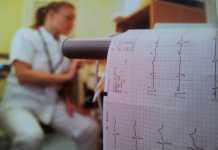August 2007 - The research, funded with a grant of �95,000 the Biotechnology and Biological Sciences Research Council (BBSRC), is looking at the process that turns a stem cell into a cardiomyocyte - the beating cell that makes up the heart.
The Nottingham researchers are developing a new system to monitor cardiomyocytes in real time as they differentiate from stem cells into beating heart cells. The system uses electrophysiology to record the electrical properties in a cell and will be the first time it has been used to study cardiomyocyte cells in the UK.
The researchers hope that their research could provide more detailed information on the electrical activity of stem cell derived cardiomyocytes. In the longer term, this could facilitate their use in regenerating the damaged hearts of heart attack victims.
Dr Chris Denning, of the University's Wolfson Centre for Stem Cells, Tissue Engineering & Modelling, said: "Human embryonic stem cells promise unrivalled opportunities. However, they are difficult, time-consuming and expensive to grow in the lab.
"Our understanding of how to convert them into cardiomyocytes is poor. At the moment we only know how to produce a few million cardiomyocytes, but to treat just one heart attack patient, we may need one billion that all function in the correct way."
Continue Reading Below ↓↓↓
To help overcome the many challenges that stem cells bring, Dr Denning and co-investigator Professor Stephen Hill plan to engineer a novel system for real-time analysis of cardiomyocytes during early development so their properties are better understood.
The team has already demonstrated that sufficient numbers of stem cell-derived cardiomyocytes can be produced for detailed analysis and they plan to use new 'electrophysiology' systems to record changes in the cells when cultured. Electrophysiology is the study of cells' electrical properties and this is the first time that the method has been used in the UK to study stem cell-cardiomyocyte biology.
Dr Denning added: "This research will enable rapid development of stem cell-derived cardiomyocytes as a tool for understanding the heart and its diseases.
"But before we can consider using stem cells to treat heart-attack patients there are many problems which will take many years to solve. We don't yet know how to deliver the cells to a patient's heart and prevent them being washed away so that they actually stay in the heart and both survive and function.
"It will take many years to overcome these challenges and put stem cell-derived cardiomyocytes into medical usage."
The researchers will also be monitoring how the cells respond to different pharmacological agents in order to improve drug-screening processes and reduce the need for animal testing.
"A key part of the project is to monitor the effects of different drugs on the cells," said Dr Denning. "At present, only limited information is available on how they respond to pharmacological or gene modulating agents.
"Between 1990 and 2001, 8 different drugs were withdrawn from the market in the USA at an estimated cost of $8billion because they caused unexpected deaths in several hundred patients. Our aim is to reduce such occurrences by having better test methods to test the drugs before they reach the clinic.
"By studying the drugs' effects on the heart cells in the lab, this could reduce the need for animals in clinical trials."










